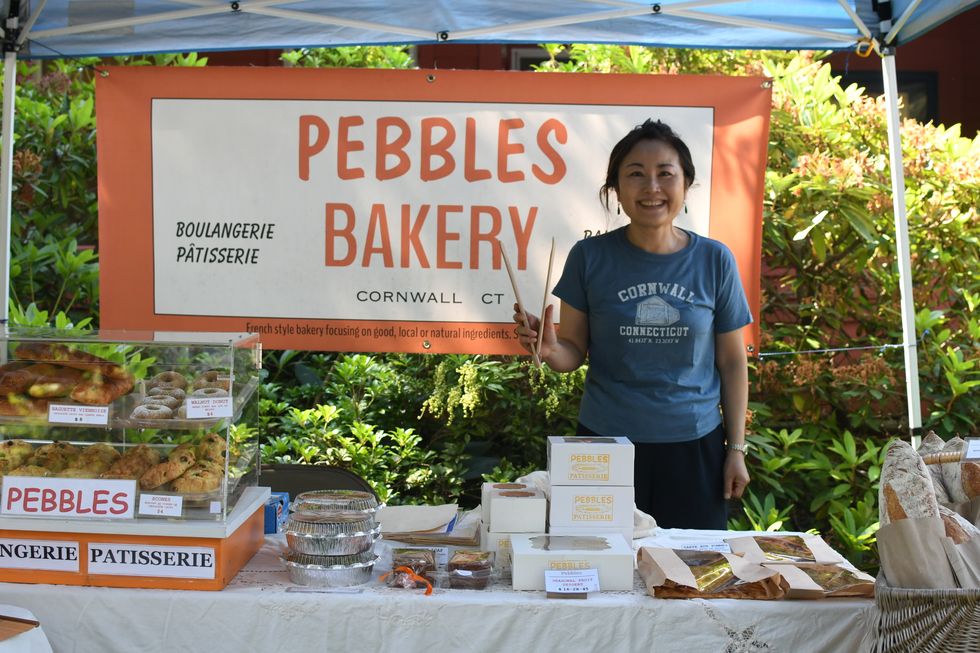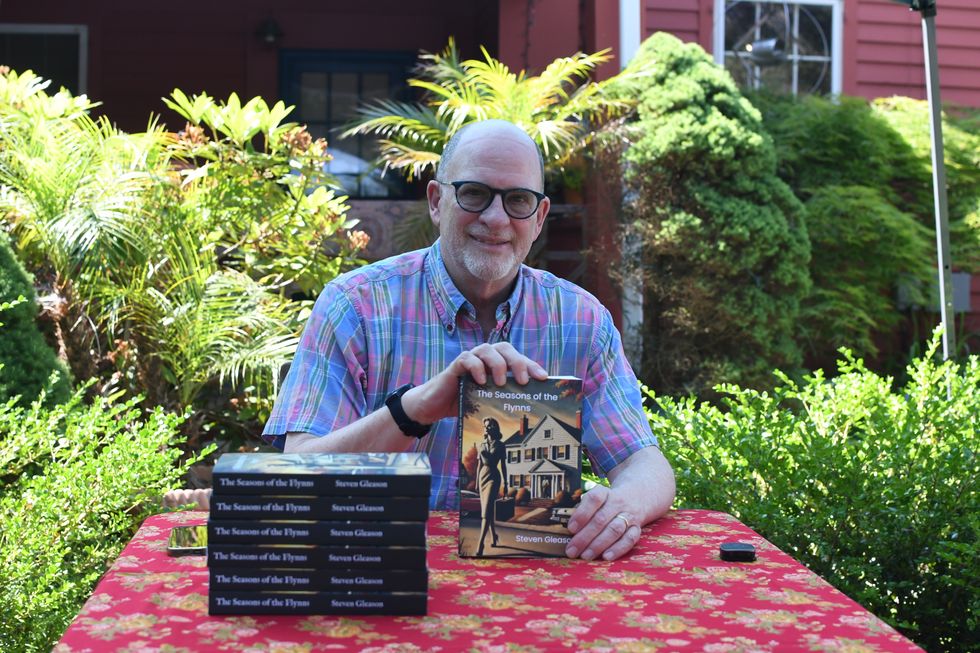Latest News
Midday warmth in West Cornwall
Nick “The Knife” Jacobs inspects a recently sharpened blade at the West Cornwall farmer’s market June 21.
WEST CORNWALL — As the sun climbed higher, Cornwall began to bustle with growing energy. The lawn of the Wish House was filled Saturday with an assortment of area artisans.
Nick “The Knife” Jacobs was on hand, as he has been for about 20 years, to sharpen knives and tools for anyone in need.
Tools include, “clippers, loppers, snippers, shears and sides. Everything except saws,” Jacobs said. “When I’m done, they’re pretty much razor sharp.”
Jacobs offers his service weekly at the West Cornwall farmer’s market and he also makes house calls 860-672-6075.

Jiwon Lee of Pebbles Bakery was serving up handmade baked goods and fermented vegetables. “I’m the local French, Korean baker,” she said. Lee uses “principally local, organic and seasonal ingredients.”
Made in Cornwall, her products “cater to the local taste,” she explained, and are “made with health in mind, low sugar, low flour.”
Mother Tree Remedies by Treasa Pattison had herbal goods “made with plants grown and foraged here in Cornwall,” she said. Options included natural pain relievers with medicinal plants for arthritis, sore muscles, skin and lips. She also had organic bug spray, magnesium spray for leg cramps and a selection of teas.

Author Steven Gleason, of Kent, was selling and signing copies of his latest book, “The Seasons of the Flynns.”
He described the novel about a 1960s family that moves to the suburbs. The wife, an aspiring actress, ends up living “not such a calm life” with complications and a husband prone to “temptations,” political and otherwise.

It was Gleason’s first time at the West Cornwall market and he said it was a positive experience. Bianka Griggs, owner of the Wish House, which hosts the market, was reportedly a big help, contributing a tent and table for his booth.
A stand was set up selling jams to raise money for the Chapel of All Saints, which meets at Trinity Retreat in West Cornwall. The preserves, jarred at Cream Hill Farm, were unique varieties including blueberry mojito jam, pineapple cranberry jam and apple pie jam.

Nick Moran and Carol Leven played live music on the lawn. The jazz duo lives in Sharon and performs at the farmer’s market once a month, usually on the first Saturday.
Leven was on vocals and percussion while Moran played guitar. They opened their set with a smooth rendition of “Pennies from Heaven.”
Afternoon retreat
Cornwall’s 10th annual Books and Blooms garden tours were in full swing Saturday with four private gardens open to the public. One of the four was the Trapp garden on River Road. It overlooks the Housatonic River in West Cornwall with multi-leveled terraces creating secluded coves that invoke a Tuscan charm atop the rocky, Cornwall landscape. Guests were greeted by tranquil scenes as they wandered along leafy, veiled paths that connected each level.

The House of Representatives in session on February 24, 2025, at the state Capitol in Hartford.
Over six dozen Connecticut laws, including the state’s next budget and bond package, will wholly or partially take effect on July 1.
Here’s a look at some of the dozens of laws that will be implemented next month.
New biennial budget
Now with Gov. Ned Lamont’s signature, Connecticut’s next biennial state budget will take effect at the beginning of the state’s next fiscal year, which is July 1.
The budget prioritizes children, would boost funds for nonprofit social service agencies two years from now, and would increase taxes on corporations. It also dramatically scales back a pledged boost to health care providers who treat the poor and relies on accounting maneuvers to comply with the state’s constitutional spending cap.
$9.7B bond package
A $9.7B bond package to finance school construction, transportation upgrades and other capital projects for the next two fiscal years will take effect on July 1.
The borrowing plan would expand non-education aid for cities and towns, increase affordable housing and combat homelessness, bolster security at places of worship and support construction and renovation of child care facilities.
It recommends new capital investments in higher education — including $5 million to advance the planned renovation of Gampel Pavilion at the University of Connecticut — and a new $60 million program to help K-12 school districts fund small-scale renovation projects.
Education requirements in public schools
Beginning in the 2025-26 school year, Connecticut public schools will be required to add two units to their social studies curriculum: Asian American and Pacific Islander history and civics and media literacy.
The AAPI studies provision, part of a bill that lawmakers passed in 2022, requires schools to teach the history of Asian American and Pacific Islanders in the state, region and country, including the contributions of AAPI individuals and communities to the United States’ arts, sciences, government, economy and civil rights advancements.
A separate law that passed in 2023 requires the civics and media literacy lessons. Civics is defined in the bill as “the study of the rights and obligations of citizens” and media literacy will cover the role of all forms of media in society and how to use, evaluate and analyze the media that a person consumes or creates.
Absentee ballot drop box recordings
As of July 1, municipalities are required to have implemented video recording technology, complete with date and time evidence, at each of their absentee ballot drop boxes. They will be required to start recording the boxes on the first day absentee ballots are issued for an election or primary and continue recording until the town clerk retrieves the last ballots.
The law also requires that the recordings be made available to the public as soon as possible — and no later than five days after the town clerk’s last ballot retrieval — and that they keep the recordings for at least a year.
Legislators approved that requirement in the wake of an absentee ballot abuse scandal in Bridgeport, where a court ordered a re-do of the city’s 2023 Democratic primary after a video surfaced of Democratic Town Committee vice chairwoman Wanda Geter-Pataky appearing to place multiple absentee ballots into a Bridgeport absentee ballot drop box.
Five people, including Geter-Pataky and three Bridgeport council members, have been charged with election-related crimes as part of a sprawling investigation into that primary.
Limits on library e-book contracts
This year, lawmakers gave full passage to a bill designed to address the high costs libraries incur when buying electronic and audiobooks by banning them from entering into contracts with e-book publishers that contain terms that some lawmakers call restrictive.
E-book contracts for libraries often come with terms that mean the library has to re-purchase the book after it’s been borrowed 26 times or every couple of years, whichever comes first. The law prohibits libraries from contracting with publishers that place simultaneous restrictions on the loan period of an e-book and the number of times people can borrow it.
Though the law takes effect on July 1, it will only be implemented if one or more states with a total or combined population of 7 million enact similar laws, and mandates that the state librarian check quarterly whether any other states have passed a similar law.







